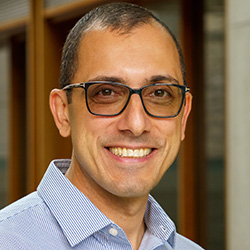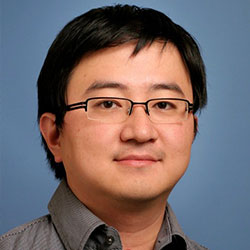Pedram Khalili and Qi Zhu Receive Gifts from Global Nokia Donation Program
The gifts strengthen collaborations between Northwestern and Nokia
Northwestern Engineering’s Pedram Khalili and Qi Zhu received gifts from Nokia University Donation Program as part of a developing relationship between Northwestern University researchers and the global telecommunications group. The gifts support research in machine learning (ML) and artificial intelligence (AI) hardware and Internet-of-Things (IoT) systems, which are the key research areas within Nokia.
“It is fortunate to have a first-rate research organization like Nokia Bell Labs in our ‘neighborhood,’” said Randall Berry, John A. Dever Professor of Electrical and Computer Engineering and department chair. “These gifts provide a great opportunity to further strengthen collaborations between Nokia and Northwestern.”

Khalili aims to develop new types of artificial neural networks (ANN) based on an emerging type of memory called magnetic random-access memory (MRAM), which is being adopted today by major semiconductor manufacturers. This manufacturing implementation enables the use of these technologies for unconventional computing architectures that use the “stochasticity” of MRAM cells (rather than their data retention or “nonvolatility”) to perform energy-efficient computing operations. For neural networks, this can be taken advantage of to achieve vastly better energy efficiency and small size.
“In addition to the financial support, which is extremely helpful given how expensive hardware development is, the interaction with Nokia researchers will be very valuable to our research,” Khalili said. “We hope to learn more about the real-world requirements and end-user perspectives on Edge ML hardware, which can in turn help direct and focus our research toward more impactful directions.
“These interactions will also be very helpful to our students, who will benefit from discussions and feedback from leading researchers in industry,” Khalili added. “We hope that this project will be a starting point for a long-term mutually beneficial relationship between Nokia and Northwestern ECE, and we are immensely grateful to Nokia for this.”

Industrial IoT systems have shown promise in industries such as advanced manufacturing, connected and autonomous vehicles, smart buildings and infrastructures, and precision agriculture. Many of these IoT systems operate in highly dynamic, noisy, and potentially hazardous environments. Achieving better IoT system safety, performance, and robustness remains an open challenge given strict execution timelines, often limited resources, constant disturbances from the environment, and increasing adoption of complex ML techniques.
In his project, Zhu aims to develop new methods that ensure the safety of IoT runtime adaptation under environment and execution disturbances, the efficiency and robustness of ML-based implementations, and the automatic trade-off among multiple system objectives across functional and software layers.
“We are immensely grateful for the gift from Nokia,” Zhu said. “It will greatly facilitate our work in this area by providing valuable financial support for our students and opportunities for us to interact with Nokia researchers. Their insight into industrial challenges and feedback on our findings could help us develop approaches that have both scientific and practical significance and answer critical questions in enabling learning-based IoT applications.”
